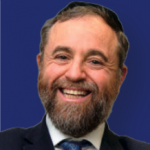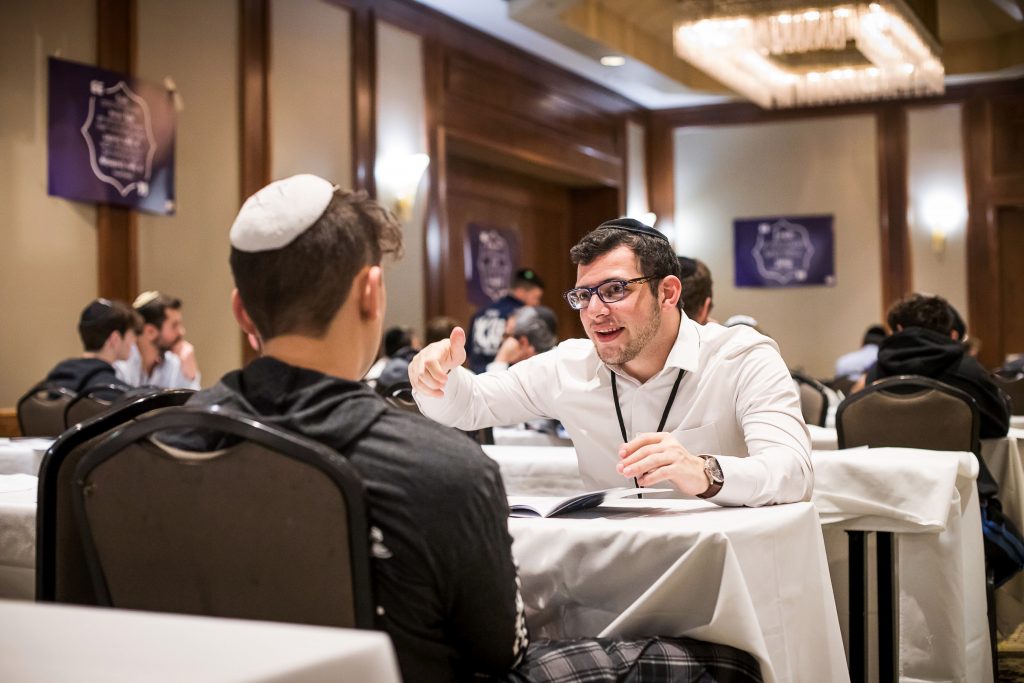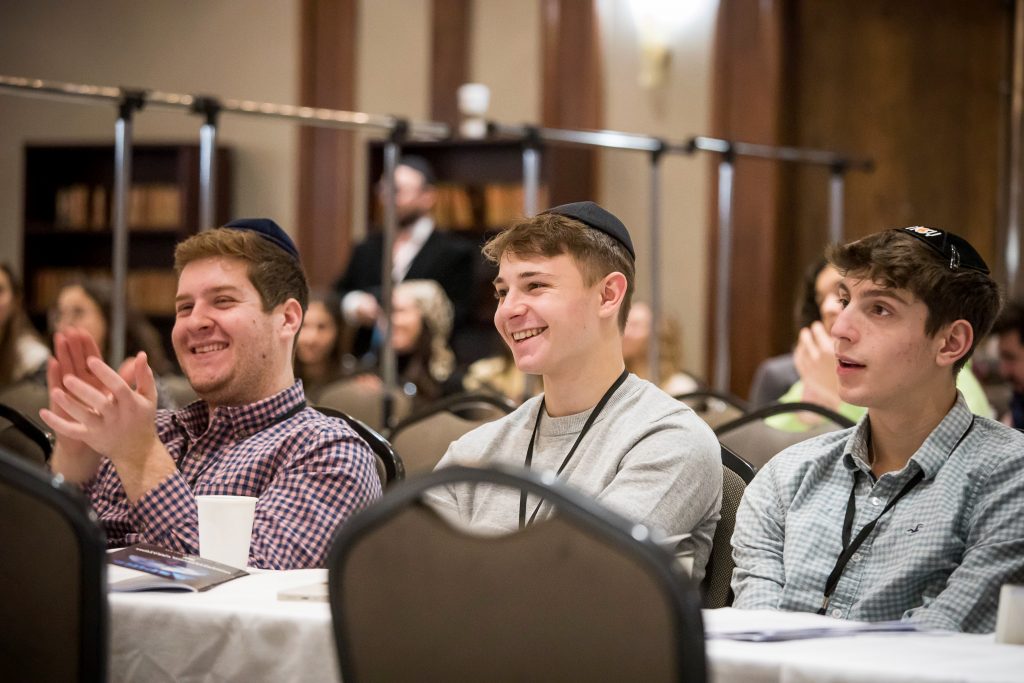Conversations on Inreach
When it comes to the chinuch of our children, both in our homes as well as in our schools and yeshivot, what should we do to better inculcate a lifelong passion for Yiddishkeit in all of our children?
As told to Merri Ukraincik
We know that about 30 percent of American Jews today who were raised Orthodox opted out of the frum community as adults. But instead of a defensive scrambling to patch up holes in the system, we need to go on the offensive to keep our students in.
Our job as teachers is to make Torah Judaism relatable and inspiring, not only in the studying of it but also in the living of it—between classes, in after-school programs, on Shabbatons. Just look at the magic that happens when kids dance and sing during a kumzitz. Our passion for Yiddishkeit becomes contagious when it is sincere. Our students know when it is not.
But more important than any curriculum is helping young people find the unique light within themselves. Students generally want to grow and connect both religiously and on a personal level with their teachers. They ask themselves, “Why am I here in the world?” They turn to us to help them figure out their individual missions. We must put our faith in them, encouraging them to ask difficult questions and showing them that we take their comments seriously. This gives them a voice and a sense of ownership in their Judaism.
Our kids tend to flourish in camp because the achievement tent is wide enough to include activities like theater, dance and sports. But in many schools, the definition of success has narrowed to the point where those who do not ace their classes or get accepted to the “right” college, seminary or mesivta wonder if they fit in at all. Students who thrive academically make up the 20 percent of the student body that loves school. Another 20 percent is the group that struggles in one or multiple ways—academically, behaviorally and/or because these students are already not buying in. Both spectra command a great deal of attention from school faculty and administration. Yet the children that comprise the middle 60 percent also want to be noticed. They may strive academically, but if they fail, they ultimately prefer negative attention to no attention at all.
Our mettle as educators—as well as our ability to lower those opting-out statistics—lies in recognizing these children for their abilities beyond test performance. We must broaden the range of ways students can feel accomplished. We need to see them for who they are, not what they achieve in the classroom. We also have to recognize the critical role technology plays, and to figure out how to best leverage it. What it boils down to is this: keeping our kids connected hinges on making them feel their presence matters in a genuine way, regardless of the tier they are in. We all want to feel loved, valued and respected where we are. Otherwise, we seek those things wherever we can get them.
I openly discuss these issues with my students. They agree that it is the relationships we establish with them and our willingness to see their inherent goodness that have the most meaningful impact on their buy-in at school and, ultimately, within the community. Teens are vulnerable. When we empathize with them in a real way, it evokes the feeling that the Torah understands them too. We have an important role to play. To show them we care. To find out about their hobbies and talents, their family life, what is meaningful to them, what their dreams are.
I cannot say this enough: teens are starving for our acknowledgment and encouragement. When they feel we believe in them, they begin to believe in themselves.
In my dream world, we would have the opportunity to also bulk up their leadership muscles, enabling them to see how they could use their own strengths to inspire others. I want to create programs that give students a platform to influence both their fellow students and members of their own community—even beyond. Let’s give them the chance to sit in the driver’s seat. That’s when passion and ownership kick in. And this, I believe, is what will make all the difference for the long term—not only for that 30 percent but for all of us.
Jaclyn Sova holds an MA in education and is a doctoral candidate at the Azrieli Graduate School of Education and Administration. She lives with her family in Baltimore, Maryland, where she teaches at Bnos Yisroel high school; she also lectures regularly throughout the community. Ms. Sova is the founder of BG Cubed (Baltimore Girls Gain and Grow), which provides mentors and programming to Bais Yaakov girls and nurtures them as leaders.
Merri Ukraincik has written for the Forward, the New York Jewish Week, Hevria, the Wisdom Daily, Tablet and other publications, including Jewish Action. She is the author of I Live. Send Help, a history of the American Jewish Joint Distribution Committee (JDC).
I would like to suggest that the answer to the questions above is rather simple. We must set the instilling of a lifelong passion for Yiddishkeit as the main objective and purpose of our education. Once we know where we are going and are clear about our ultimate goal, we’ll have a great chance of getting there.
A day school’s aim should not be to cover ground; or to have our youngsters memorize meaningless lists; or to make sure that our students score high grades; or to make sure students work hard for the sake of working hard. Instead, it should be to instill a lifelong passion for Yiddishkeit.
Why did Hashem create the world?
Why does Hashem want us to do the mitzvos?
Why do we have a yetzer hara? Wouldn’t it be better if we could live a life of easily achieved mitzvos and ma’asim tovim without any struggles?
Why do we say the same words when we daven Shacharis, Minchah and Ma’ariv?
Why does Hashem want us to ask for our needs if He already knows what we are lacking?
What is the neshamah?
Should our fourteen-year-olds know the answers to these questions? Do they? Do some research. You may be surprised to discover that while at this age we expect our children to know these very basic fundamentals of Yiddishkeit, the overwhelming majority of our teenagers do not. How can we expect our children to gain a lifelong passion for living a Torah life if they can’t even answer a simple list of questions about the most basic concepts of authentic Judaism? I challenge you to show me where in a typical curriculum we have the answers to the above-mentioned questions.
Take the subject of emunah. Which teenager doesn’t know that we must believe in Hashem? Every child learns at age three or four that Hashem created the world! While it is true that our children begin their pure lives hearing these fundamental concepts, do we make sure to move on from there as they grow? Do we continue discussing the concepts of emunah and how they pertain to our lives? Far too many of our students today are deficient in the most basic factual and conceptual understanding of what it means to be a Torah-observant Jew.
All of us involved in the education of our children must ask ourselves some tough questions:
What is the outcome we are striving for when we teach our children? What do we want them to have acquired by the time they graduate eighth or twelfth grade?
How much time are we investing in teaching the core curriculum, and how much attention and hype are we investing in the extras? The crux of the answer to this question is acquired by defining what that core is.
What are the basics of our mesorah that have inadvertently fallen to the wayside and lack sufficient focus in our educational system?
How are our curriculums created? And are we developing the proper scope and sequence containing a healthy progression from year to year and from subject to subject?
Successful chinuch must include not only book knowledge but also a conscious inculcation of the foundations of Yiddishkeit—our most important goal for our students. Although our children’s school days are long, the curriculum is extremely demanding. As a result, many teachers find themselves scrambling to fill their educational “quotas” and simply cannot find the time to emphasize the most important subjects, such as emunah and bitachon and the hashkafos of avodas Hashem. Difficult as it may be, this must change. It is not enough for schools to teach students the “hows” of performing mitzvos; they must teach the “whys” and offer answers to our children’s questions regarding our most fundamental beliefs. If we can develop a meaningful and essential set of expectations, we can, and with the help of Hashem we will, succeed in raising our next generation to understand and to appreciate what it means to be Jewish and to feel proud to be living an authentic and meaningful Jewish life.
Rabbi S. Binyomin Ginsberg has been a Jewish educator for almost forty years. After receiving semichah as well as his master’s degree, he began his career as a rebbi, then served as a principal. He is a prominent author, lecturer, educational consultant, teacher-trainer and parenting expert.
The challenge when conducting any type of research is that one must isolate variables in order to test them, a task that is often daunting, if not outright impossible. I like to call this “separating the spaghetti strands.”
One of the findings from the most recent Pew study indicated that the drop-out rate in the frum community is significant enough to warrant attention. While this doesn’t begin to compare with that of the non-Orthodox community, we cannot be complacent and deem ourselves inoculated from such tragic losses to our people. Although there are numerous contributing factors, surely the direction we provide to our developing children and adolescents necessarily impacts on these outcomes, both positively and negatively.
I was asked to reflect on ways to ensure that our yeshivah students graduate inspired and energized about Judaism. One of my favorite aphorisms is that for every simple question there is a simple answer. And it is usually wrong. Given that this is meant to be a 700-word article rather than an entire book, it is quite an intimidating assignment.
I will therefore limit my comment to one component that I consider essential in our children’s chinuch. When Hashem tells Moshe to go to Pharaoh to begin the mission of the redemption of the Jewish people, He tells him to identify Bnei Yisrael as “Beni bechori Yisrael” (Shemot 4:22). Simply put, we are G-d’s firstborn, beloved child. Period. The degree of immorality and depravity we had sunk to while in exile did not matter. We were to be freed because Hashem relates to us as a father to his cherished child. Relating to Hashem is especially challenging for us because we cannot utilize the very senses we rely on to know about everything else. However, I would posit that the reason we are created with parents altogether and why they hold a unique status both in halachah and in our lives is in order to facilitate the ability to have some degree of conceptualization of how we are meant to relate to our Creator. What does this have to do with chinuch? Literally everything.
Anyone who enters the field of chinuch (and please take note that I did not say education) is acting as a proxy for a parent. When we are instructed with the words “Veshinantam l’vanecha” (Devarim 6:7) regarding the continuity of teaching Torah, Rashi quotes the Sifrei, which informs us that this is referring to our talmidim. If one reflects on this statement for just a moment, the ramifications are staggering. The one time the Torah informs us of the mitzvah to transmit the Torah to our children, it almost seems like Chazal hijack it and apply it to rabbeim rather than just leaving it with parents! Why would they do that? I believe that this is not to highlight some quaint notion that we should treat our talmidim like we would treat our own children. It means that in order to properly fulfill our Divine mission as mechanchim, we must shift our internal paradigms and assume the role of parents in a literal sense. We have to care for these children as we do our own. This is an exceptionally formidable undertaking and surely much easier said than done. However, we can never lose sight of the fact that this is the role we are mandated to assume when we accept this awesome responsibility. And to carry this to its complete inference, when we do so we are emulating the very way in which Hashem relates to us, His firstborn!
When I began teaching thirty-five years ago, I was told by a very experienced rebbi, Rabbi Mordechai Lurie, that if there is a child in your class whom you don’t like or to whom you just cannot relate, you have no right to be teaching him. While at the time it seemed a little extreme, with experience I internalized this crucial message. When we feel disconnected from our talmidim, we must come to realize that the lack is in us and that we will be unable to fulfill our holy mission. Yes, some children are harder to love than others, but we can never forget that they are our children and, more importantly, the children of Hashem.
Will this ensure inspired graduates from our Torah institutions? Probably not entirely, and there are never any guarantees. However, I am quite certain that this particular strand of spaghetti is a vital component of a healthy diet.
Rabbi Mordechai Yaffe is rosh hayeshivahof Mesivta Ateres Yaakov (MAY) and the ravof Kehilla Ateres Yaakov in Lawrence, New York. Rabbi Yaffe holds a PhD in clinical psychology and is licensed to practice in the State of New York.
 Rabbi Zvi Teitelbaum
Rabbi Zvi Teitelbaum
As told to Barbara Bensoussan
The biggest challenge in this generation is the battle against apathy. So many students today just aren’t “feeling it.” Our goal must be to get them to feel simchah in Yiddishkeit and to be happy with themselves. (Kids who have suffered abuse are a different story, although I don’t encounter that very often.)
Today’s generation needs to feel loved and validated. Our students need to know that we won’t dismiss their questions; even if we don’t agree with them, they should feel listened to. Classroom time should even be taken to discuss their concerns. I frequently speak to my students about hashkafah since more than truth, these kids are searching for meaning. When we teach Chumash or even Gemara, we need to show our students how it’s relevant to their lives and how it can help them become better people with better relationships. You can tease out relevance even from very abstract gemaras, showing how the Gemara’s logic is applicable in different scenarios. For example, there is a gemara that asks—if you find a wrapped piece of meat on the ground in the marketplace, can you assume it’s kosher? My students reflexively respond “no,” but the Gemara says that the answer depends on whether or not the majority of the shops in the area are kosher; it’s a matter of probability. I then show them how we need to use probability in making decisions in life. When it comes to believing in Hashem, for example, it’s not about proving with 100 percent certainty that Hashem exists but proving the high probability that there is a Creator in the world. Another challenge in teaching today’s students is their access to technology and media. Smartphones have changed our lives. Kids have access to the world all day, all the time. They know everything about nothing, lots of data without any purpose or meaningful analysis; random Snapple facts. Even if students are looking at innocuous stuff on their phones—although today there’s so little that’s truly innocuous—it disturbs their schedules. Time boundaries disappear. They stay up late and develop erratic, disruptive sleep patterns. Additionally, their focus is affected by the constant jumping from one form of entertainment to another.
Given all these distractions, a rebbi today has to be something of an entertainer. He needs to make the presentation of the Gemara more “geshmak.” I break learning into shorter segments, forty-five minutes versus an hour and a half, since my students’ attention spans are attenuated.
Today’s bachurim are also much more aware of current events than in the past. I therefore sometimes use world events as a teaching opportunity, discussing how to interpret what’s going on from a Torah perspective. I show my talmidim that Torah isn’t exclusive to a blatt Gemara; all of it is relevant to our lives.
While most of my students don’t expect to continue learning full time later in life, they need to see that Torah can make them feel fulfilled. They need to learn how to distinguish between real and counterfeit pleasures. In learning, for example, they discover they may have to break their heads a little, but afterwards they will experience a sense of satisfaction that is very rewarding. One of my classes is finishing a masechta now, and it’s exciting for the boys. They have a real feeling of accomplishment.
All teens have struggles, and that’s okay. The Navi states: “Im yiheyu chata’eichem kashanim, kasheleg yalbinu—Be your sins like crimson, they can turn snow-white; Be they red as dyed wool, they can become like fleece” (Yeshayah 1:18). Kashanim means red, but it also means years. So what the pasuk may be teaching us is this: if a child’s struggles are age appropriate (kashanim), you can make an allowance for that. Don’t panic or come down too harshly on him. He may need time to work it through.
There are times a teen drops out of sight and you think you had no influence, and then a few years later you get a call telling you he’s in a yeshivah in Israel shteiging away. Both frum-from-births and ba’alei teshuvah often just need some space or time to work things out.
Rabbi Zvi Teitelbaum is a rebbi in the Yeshiva of Greater Washington high school and the founder and executive director of Mesorah DC, an outreach organization serving the greater Washington area.
A longtime Jewish Action contributor, Barbara Bensoussan is the author of articles and books including Pride and Preference (New York, 2020).





